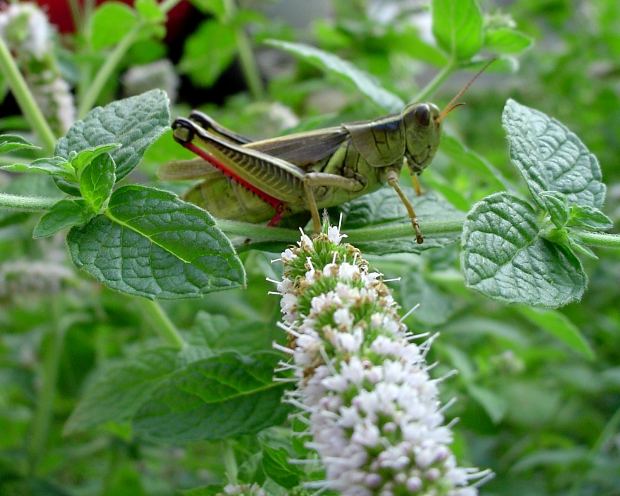- Keep the garden weeded. Grasshoppers prefer dense, grass-like environments, so keeping the garden sparse does a lot to move them along.
- Give them grass instead. Since grasshoppers prefer thick grass anyway, leave some as a border for the pests to inhabit instead. Leave a tall hedge of grass near the garden edge and keep the garden weeded, and they’ll gravitate towards the grass and away from your precious veggies.
- Enlist the birds. Many birds love to feast on grasshoppers, so make it easy for them. They particularly like to have perches to land on and watch for bugs, so install some trellises and perches to help bring birds in. Birdhouses and brush for shelter can also bring birds in to snack on your hoppers.
- Use companion plants. If grasshoppers are consistently a problem, plant deterrent plants near targeted areas. Grasshoppers are said to hate cilantro, horehound and calendula, so these can all be good choices to scatter in the garden (and they all have other great garden uses anyway).
- Use poultry. Chickens love to eat grasshoppers but they can do as much damage to your garden as the hoppers. Some chicken owners find clever ways to put them to use with chicken moats around gardens. Others report that turkeys are much more polite to garden plants and do a better job of eating up the grasshoppers.
- Put kids to work. A small fish tank net is an excellent grasshopper catcher, and kids can pretty quickly catch a lot of grasshoppers that they can transfer into a jar with a lid. Agree to pay them a dime per grasshopper or whatever you agree is a fair price, and they can supplement their allowances and help the garden at the same time.
- Get them wet. Grasshoppers are very susceptible to diseases when their environment is damp. Even using the sprinkler several times a day for short periods does a very good job of moving them on out of my gardens.
- Keep your soil healthy and organic. Normal, healthy soil is teeming with bugs like blister beetles that prey on grasshoppers and microscopic predators that give them diseases. Chemical pesticides are likely to kill off the healthy bugs that will take care of grasshoppers for you.
- Use row covers. If you’ve got a really severe grasshopper problem going on, row covers are considered the best recourse. Fabric and aluminum-screen row covers can help, particularly if they’re held up above the plant leaves (otherwise grasshoppers are known to chew right through them).
- Keep it in perspective. I was really annoyed at the grasshoppers in my gardens until I realized that most of the damage they were doing was to the leaves of my potato plants, since that was where the leaves were the most dense and they were happiest. I obviously don’t intend to eat the potato leaves and they haven’t done enough damage to harm the potatoes developing underground. I still worked quickly to convince them to move on out, but I realized that I didn’t need to bomb the yard just because some beady-eyed bugs were putting holes in my potato plants.
The recent hot, dry weather has brought a small plague of grasshoppers to my garden for the first time in years, and I’ve been working hard to defeat them.
We garden organically and I didn’t want to douse our family’s food sources with pesticides and poisons. Also, they’re just not terribly effective. Timing is important in their life cycle for controls to make the least bit of difference, and grasshoppers move on continually throughout the season so killing one bunch doesn’t mean another bunch won’t show up tomorrow.
Luckily, I found lots of great suggestions online and it’s already helped defeat the pesky bugs.
Here are my ten favorite grasshopper eradication tips.
The good news is that I’ve used most of these techniques for the past week and the grasshopper population has taken a dramatic dive already. A combination of weeding, directing them towards grass they can inhabit, annoying them with the water wand and some grasshopper catching with my favorite six year-old boy have all worked wonders.
The fact that my garden is already set up to naturally take care of itself is no doubt part of the reason the grasshoppers were so easy to manage, too. Organic gardening has meant that my yard is full of beneficial insects, for instance. I have lots of natural elements that bring in birds, frogs and other wildlife to further keep bugs under control. I use square foot gardening, crop rotation and mixing up beds to keep areas from having rows and rows of plants to bring large groups of plant-specific pests. As time passes, organic gardening makes gardening practices easier and easier in ways like these.
Now if only our city would let us keep chickens….
…
This article originally appeared on my green living column at examiner.com.
Please follow and like us:






